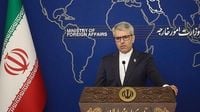Iranian diplomats and government officials attending the United Nations General Assembly in New York this September have found their shopping options dramatically curtailed, as the United States rolled out a new set of restrictions targeting their access to popular wholesale retailers and luxury goods. The announcement, published in the Federal Register and timed to coincide with the high-profile UN summit, signals a fresh escalation in the ongoing tensions between Washington and Tehran—one that’s being described as both symbolic and strategic by analysts on both sides.
Under the new rules, Iranian diplomats and their accompanying family members are now prohibited from shopping at wholesale giants like Costco, Sam’s Club, and BJ’s Wholesale Club without first securing special approval from the U.S. State Department. The restrictions, which came into effect in late September 2025, also extend to the purchase of so-called “luxury goods”—a category that includes watches, electronics, fountain pens valued at more than $1,000, and vehicles priced above $60,000. Even bulk household goods, once a staple of visiting delegations’ shopping sprees, now require explicit clearance from U.S. authorities.
According to The New Indian Express, the State Department has characterized these curbs as “maximum pressure.” Thomas Pigott, speaking for the State Department, said, “We will not allow the Iranian regime to allow its clerical elites to have a shopping spree in New York while the Iranian people endure poverty, crumbling infrastructure, and dire shortages of water and electricity.” The move, Pigott added, is intended to send an unmistakable message: the privileges of Iranian officials in the U.S. will not outpace the hardships faced by ordinary Iranians back home.
This isn’t the first time Iranian diplomats have found their movements and activities restricted on American soil. Since 2019, U.S. policy has confined their travel to a narrow corridor around the UN complex in Manhattan, forbidding excursions beyond Kennedy Airport, the Iranian mission, or the ambassador’s residence. In a particularly pointed episode, former foreign minister Mohammad Javad Zarif was once barred from visiting a New York hospital where the Iranian ambassador was receiving treatment. Similar travel and conduct restrictions have been imposed on diplomats from Russia and China, with the latter required to notify the State Department of any meetings held in the U.S. since 2019.
But the latest shopping ban, while sweeping in its language, appears to be as much about optics as it is about enforcement. For years, photos of Iranian officials loading up on American consumer goods—everything from flat-screen TVs to boxes of cereal—have circulated widely in Iran, fueling public resentment. As Omid Memarian, an Iran expert at DAWN, a Washington-based research group, told BBC, “For years, many Iranians have been dissatisfied—and even angry—that large delegations travel with presidents to New York, imposing significant costs on the nation in the midst of sanctions and economic austerity.”
Ali Vaez, Iran project director at the International Crisis Group, echoed this sentiment, noting that the restrictions are “primarily aimed at deepening the wedge between the Iranian state and society.” Yet Vaez cautioned that the move could also appear “petty” coming from “the superpower who hosts the UN to try to regulate the shopping of its international guests.”
The Iranian government has condemned the new rules as both unprecedented and a violation of international obligations. Esmaeil Baghaei, Iran’s Foreign Ministry spokesman, took to social media to lambast what he called the “cheap” restrictions and “systematic harassment” of Iranian delegates. In a post on X (formerly Twitter), Baghaei stated, “The real objective behind the increasing restrictions imposed by the US administration on Iranian diplomats and their dependants in New York is to disrupt Iran’s diplomatic performance within the United Nations. The US systematic harassment of Iranian diplomats has obstructed the Iranian delegates from attending several multilateral events that were held outside the so-called ‘permitted parameters’ during this week only.”
Baghaei went further, describing the curbs as “a blatant violation of the US obligations under the Headquarters Agreement” of 1947, which governs the conduct of the UN’s host country. “Applying such cheap restrictions on our diplomats’ movements and even on their daily grocery shopping is not only a blatant violation of the US obligations under the Headquarters Agreement but also a new low in terms of showcasing the extent of animosity of US administration toward Iranians,” he added.
The timing of the restrictions is especially notable. They were announced just as President Masoud Pezeshkian prepared to address the 80th session of the UN General Assembly, a gathering already overshadowed by the fallout from a 12-day war in June 2025. That conflict, initiated by an Israeli strike against Iran, resulted in at least 1,064 Iranian casualties, including military commanders, nuclear scientists, and civilians. In the aftermath, the United States escalated matters further by launching bomb and missile attacks on three Iranian nuclear facilities. According to Press TV, Iran responded with retaliatory operations that ultimately forced a ceasefire, but the episode left deep scars and heightened mistrust.
Sanctions have been a persistent theme in U.S.-Iran relations, and the new shopping restrictions are only the latest in a long line of measures intended to isolate Tehran. President Donald Trump, who ordered the June strikes on Iran’s nuclear sites, has made no secret of his desire to cripple Iran’s nuclear program and, by extension, its global standing. The sanctions regime has battered Iran’s economy, leading to shortages of essential goods and a sharp decline in oil exports—realities that, according to U.S. officials, justify the latest round of diplomatic pressure.
Yet the human impact of these policies is not lost on observers. While the restrictions are designed to target the privileges of Iranian elites, they also risk inflaming anti-American sentiment among ordinary Iranians and complicating the already fraught environment at the United Nations. The U.S., for its part, insists that the measures are both legal and necessary, pointing to similar protocols for Russian and Chinese diplomats as evidence of even-handedness.
Behind the scenes, however, some analysts question whether the shopping ban will have any meaningful effect on diplomatic negotiations or the broader U.S.-Iran relationship. “It’s a symbolic move, more about headlines than substance,” said one former State Department official, speaking on background. “But in this climate, even symbols can have consequences.”
As the General Assembly drew to a close, the images of Iranian officials—no longer seen pushing carts through American megastores—became a new symbol of the mounting barriers between the two countries. Whether the shopping ban will deepen those divides or simply fade into the background of a much larger geopolitical standoff remains to be seen. For now, it stands as the latest flashpoint in a relationship marked by suspicion, sanctions, and the ever-present specter of conflict.


